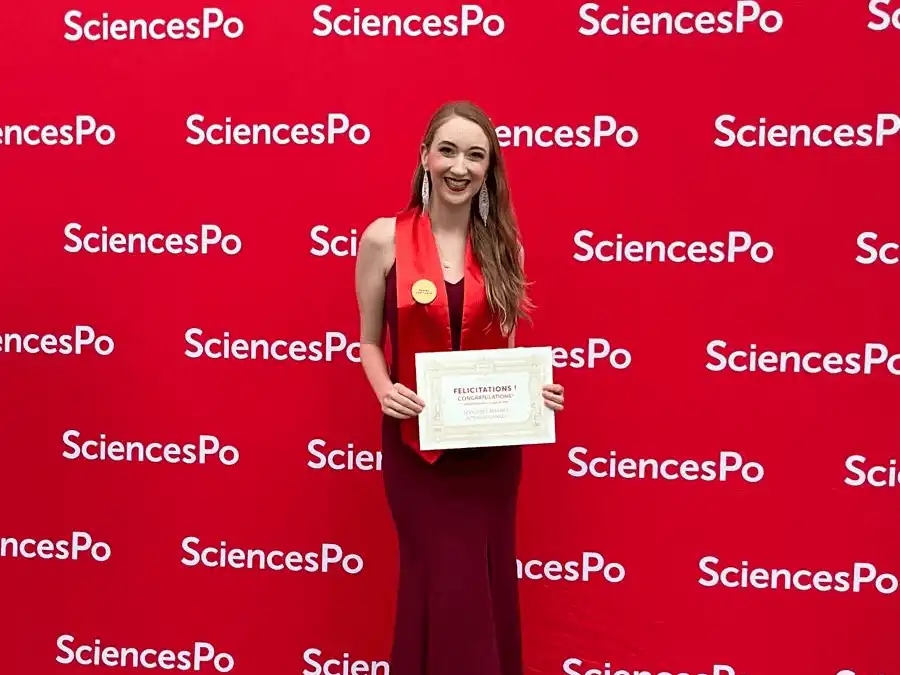Home>Meet the Graduates 2024: Tiffany Hales
19.07.2024
Meet the Graduates 2024: Tiffany Hales

In 2022, Tiffany Hales left her country, Australia, to study human rights and gender studies hand in hand in France, at Sciences Po. In this interview, she tells us more about her commitment to developing her knowledge and expertise on gender equality and women's rights.
How did you end up enrolling in gender studies courses?
I am passionate about advocating for women's rights and ending gender-based violence at a global level. However, when considering postgraduate study, I was advised not to "box myself in" and to apply for more generalist programmes, rather than strictly gender studies, so that I would be employable in a wider range of roles and organisations. As such, Sciences Po’s Gender Studies Programme offered the best of both worlds: the opportunity to obtain a graduate certification in gender studies, whilst also completing a more generalist master's programme in Human Rights and Humanitarian Action. That way, I have both a generalist profile in human rights in addition to specialist technical knowledge in women's rights and gender equality, enhancing my employability in the field and ability to take on a more diverse range of roles.
Have you been particularly influenced by any course at Sciences Po?
Helena Alviar García's course on "Discrimination and Anti-Discrimination: Historical, Literary and Legal Interpretations" fundamentally changed my relationship with feminism and how I understand the fight for gender equality. Each week, we critically analysed a different strand of feminism – liberal, socialist, radical, intersectional, and others – and read texts by key theorists and activists. In the second half of the course, we considered how each strand of feminism might be applied to real-world scenarios, including a case study of Professor Alviar García’s research on women's experiences of environmental degradation in Colombia. The discussions in class constantly pushed me to consider new perspectives and alternative ways of thinking about issues that I had previously taken for granted. Later, when writing my master's thesis about women's rights in the context of Mexico-US migration, I drew heavily on the course readings and discussions in framing how I considered issues related to women's legal and economic marginalisation and bodily autonomy. The course's insights pushed me to consider how different strands of feminism may lead us to prioritise and problematise certain issues in different ways. I would wholeheartedly recommend this course to anyone seeking to gain a deeper understanding of key feminist debates and their application to real-world scenarios.
What would be your best memory from your time at Sciences Po?
I will never forget the day I defended my master's thesis. I wrote about how the Virgin Mary, as a religious and cultural symbol, is utilised to both constrain and empower women's rights in the context of Mexico-US migration. I began thinking about my thesis topic very early on, during my first semester at Sciences Po. I knew it would be an incredibly niche topic, so I thought long and hard about how best to frame it as a thesis within the scope of the Paris School of International Affairs (PSIA). In the summer break between my first and second year, I spent just over two months in the US and Mexico conducting field research, talking to many migrant women about their lives and sharing countless stories (and comida). In the following fall semester, I spent almost every day immersed in feminist theory and debates, trying to make sense of my fieldwork in light of ongoing feminist debates about religion, gender-based violence, sexual and reproductive health, and other rights. My master's thesis defence was the grand culmination of this long process, and it was such a pleasure to share my research with the panel and to hear their insights about my findings. To be able to represent the lived experiences of the women and communities that I worked with in this way was a true honour, bringing their stories of hope, survival, and empowerment from the suburbs of central Florida and Guadalajara to the metaphorical stage in Paris.
Do you have any guidance for the next cohorts of graduates?
Society and politics are messy – embrace the complexity! Sciences Po (and your peers) will challenge you to consider new information, ideas, and perspectives, and you should never be afraid to learn something new and be challenged.
More
- The Advanced Certification in Gender Studies
- The Master in Human Rights and Humanitarian Action
- Professor Helena Alviar García teaches “Discrimination and Anti-Discrimination: Historical, Literary and Legal Interpretations” in the master’s Common Academic Curriculum